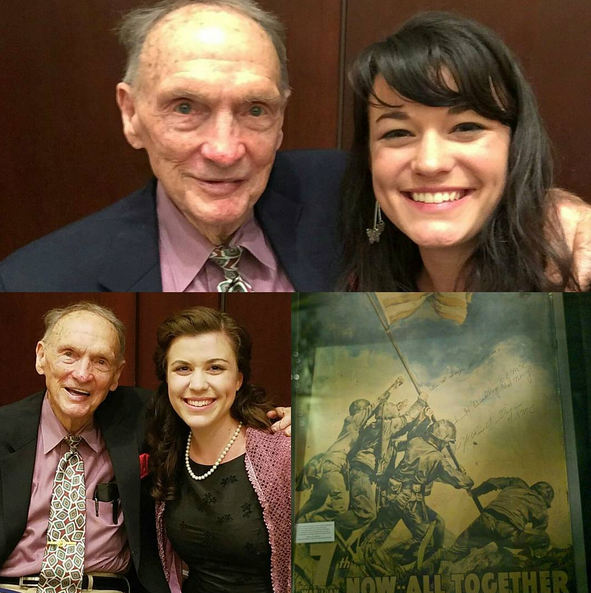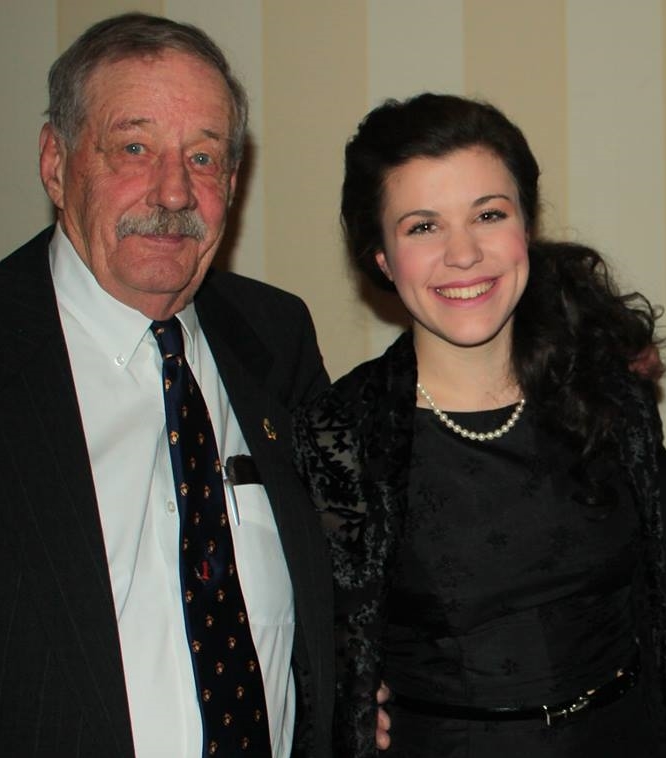"Kelley. With an 'E'"
/John Kelley (right)
One of our veteran friends who passed away last year was a fascinating Air Force Captain we met through Honor Flight in the fall of 2014. Actually, it was Mom who first became acquainted with him, and then in the following months, through exchanged letters, we got to know him a little better. We were at the WWII Memorial greeting the flights coming in, and as his guardian had wandered off, Mom went up to chat with him for a few minutes. He introduced himself as John Kelley. "Kelley with an 'E'. Not like the way women spell it." He was 95 and adamant. He wanted to make sure it was differentiated from the more feminine version of the name.
"You look good in the photo. I look like Hell -warmed over!!"
When she mentioned she was from San Antonio, it opened a floodgate of stories. Captain Kelley had been at Brooks Field, and became well versed with all the local hot-spots during his off time. He described later in a letter, "As I mentioned to you, I took my advanced flight training at Brooks Field in San Antonio. And received Wings following graduation from Brooks Field (December '43). At the time I was dating a student at Incarnate Word College, and having a ball. On "Open Post" at the Gunther Hotel. Mostly dancing up a storm. I never had so much fun in my life. I was a New York kid and grew up listening to Glenn Miller, Artie Shaw, Tommy Dorsey, Benny Goodman, Sinatra; I never missed a beat in the process."
His stories continued and each seemed to outdo the last one. The months following his Honor Flight we stayed in touch through letters. In fact despite health issues making it very difficult to write, he would send quite the tome relating his experiences in the Air Force.
"Back in 1943, I was en route to the Aleutians flying the A-24 Dive Bomber. Following the receipt of my winter flying gear, my number one friend, Scotty Alexander, and I took the planes for a test hop. That is where it all started. In the air at about 10 o'clock, Scotty dumped me and we got into a Dog Fight. We chased each other trying to get on his tail for a simulated shot. Well, we "crashed" (mid air collision). Both pilots bailed out and made it okay. I was ready to hit the ground when the parachute opened. I still shake thinking about it. I thought I had it. Scotty was found rolling his chute out of the debris. The next day we received two new planes and an 'ass' charging for committing a 'Bad Act.' It really happened in a hurry. We both were spellbound, but reacted to a real issue. We were terribly embarrassed over the act, and let it be known we were sorry to our fellow pilots. 'Gross' to say the least. We did get to combat and completed our missions. We were lucky to make it. It was exciting times."
A theme we saw in Captain Kelley was a genuine pride in having worked himself up from the ground, starting as a "New York city kid" and rising to officer status in the Air Force.
"We grew up in Queens, New York. I'm a grad of New York University at Farmingdale, New York. Graduated 1939, took agriculture, played football, and had a ball.... I consider myself a good military man. Took orders well and served (obeyed) well. When I was a cadet, I obeyed my last order first. I got to be a cadet, not too shabby for a New York City kid. I was just plain 'with it' as a new cadet."
A highpoint in his Air Force career occured on August 8, 1945: escorting the "A" Bomb to Nagasaki. "I have a photo of my flight (9 planes) when the B-29 dropped the 'A' Bomb. The picture is a jewel and depicts the way it was. Following I got the flight (4-P47s) in close and said, 'Fellows, this is it. The war is over.' And it was... I ended the war with the 'Atom Bomb' drop on Nagasaki. I actually saw the drop on Nagasaki and personally viewed the devastation (what a mess) - total ruin.
Captain Kelley had a long and varied career in the Air Force until his retirement in 1984. Regarding his service in WWII he said, "I [had] made captain in 1944. I completed two tours of combat -one in Aleutians flying Dive Bombers (A-24s) and at the end of the war P-47s in the Pacific... I consider myself as having a charmed life. Exposed to danger but lucky my life was lightened with Aeroplanes."




























